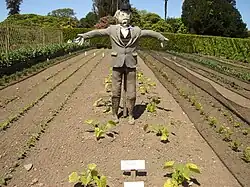biedēklis
Latvian

Putnu biedēklis (1)
Pronunciation
| (file) |
Noun
biedēklis m (2nd declension)
- an object, an image that causes fear, with which one tries to scare people or animals away
- putnu biedēklis ― scarecrow (lit. bird-scarer)
- viņš jau izskatās pēc biedēkļa ― he looks like a scarecrow
- ļaudis lika pie cāļiem, pīlēniem un zoslēniem bērnus par sargiem, kuriem bija uzdots nelaist vārnas tuvumā... kur nebija bērnu, tur ar viltu taisīja biedēkļus, lai vismaz notālēm izskatītos, ka te nolikti bērni ― people had children guard chicks, ducklings and gooselings, with the task of not letting crows come close... where there were no children, they craftly made scarecrows, so that it would look from a distance as if there were children there
- a specter, a ghost, a scary creature
- kailu galvu viņam jāstāv un jāskatās priestera liekulīgajā komēdijā... viņam, kam dievs un elle, un visi biedēkļi sen vairs tikai tukša skaņa! ― bareheaded, he had to stand and look at the priest's hypocritical comedy... he, to whom god and hell, and all scary creatures had long become only empty sounds!
- rītausmā Melnā Muiža kā biedēlis rēgojās pret balti apsarmojušo mežu ― at dawn, the Black Manor loomed against the white-frosted forest like a ghostly creature
Declension
Declension of biedēklis (2nd declension)
| singular (vienskaitlis) | plural (daudzskaitlis) | |
|---|---|---|
| nominative (nominatīvs) | biedēklis | biedēkļi |
| accusative (akuzatīvs) | biedēkli | biedēkļus |
| genitive (ģenitīvs) | biedēkļa | biedēkļu |
| dative (datīvs) | biedēklim | biedēkļiem |
| instrumental (instrumentālis) | biedēkli | biedēkļiem |
| locative (lokatīvs) | biedēklī | biedēkļos |
| vocative (vokatīvs) | biedēkli | biedēkļi |
References
- Karulis, Konstantīns (1992) “baidīt”, in Latviešu Etimoloģijas Vārdnīca (in Latvian), Rīga: AVOTS, →ISBN
This article is issued from Wiktionary. The text is licensed under Creative Commons - Attribution - Sharealike. Additional terms may apply for the media files.